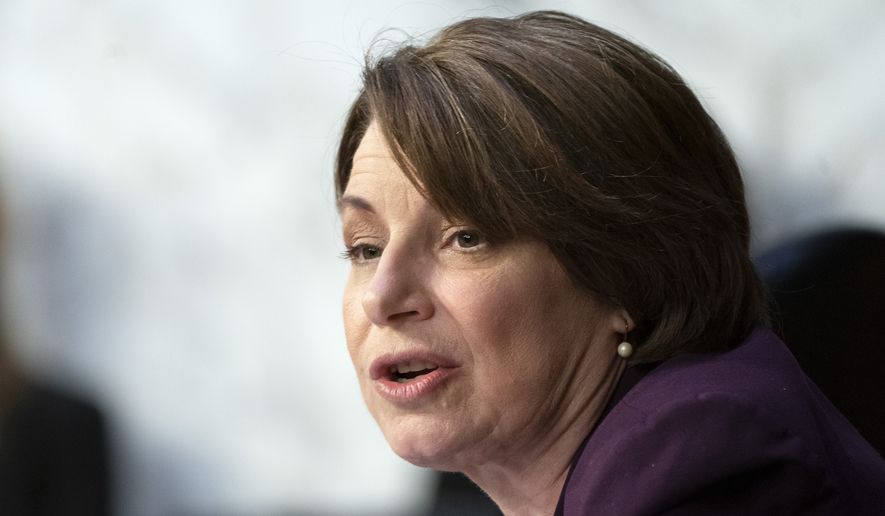The Senate Judiciary Committee on Thursday passed a bipartisan bill aimed at giving small and mid-sized news organizations more clout to negotiate compensation with Big Tech platforms, although the measure still must overcome opposition in both parties and faces an uncertain path to a vote in the full Senate.
The Journalism Competition and Preservation Act (JCPA) was passed after Republican Sen. Ted Cruz of Texas struck a compromise with one of the bill’s sponsors, Sen. Amy Klobuchar, Minnesota Democrat, to drop the ability to moderate or restrict content from any media negotiations with tech giants such as Facebook and Google.
Mr. Cruz said he agrees with Ms. Klobuchar that Big Tech is profiting from “an unfair system,” with services like Google News running stories — and selling ads — without compensating the reporting organization that originally provided the content.
“Whether you’re talking about small-town newspapers, whether you’re talking about local broadcasters, anyone in the journalism space that is producing content, Big Tech routinely, daily, hourly appropriates their content, rebroadcasts it, earns billions of dollars of revenue through advertisements in the process of rebroadcasting it … and gives not one penny of compensation for the creators of that content,” he said.
Sen. Mike Lee of Utah was among the Republicans voting against the bill.
“The bill retains the fundamental flaw of attempting to improve competition by sanctioning the formation of cartels, something that our antitrust laws go out of their way to prohibit,” Mr. Lee said. “Moreover, this bill ends up favoring large conglomerate publishers over smaller, local publishers.”
SEE ALSO: Meta cutting staff as TikTok, rivals cut into its markets: Report
Sen. Marsha Blackburn, Tennessee Republican, and Sen. Josh Hawley, Missouri Republican, also voted against the bill, but supporters said it could provide a boost for conservative news outlets in particular.
The JCPA would “support small, local, independent and conservative news publications that struggle to survive under the weight of Big Tech’s market dominance and censorship efforts,” according to the News/Media Alliance, a coalition of news organizations that includes The Washington Times.
“Today’s markup and vote was a major step towards getting small and local news publishers the fair compensation they deserve for their content,” said Alliance President & CEO David Chavern. He called on the House Judiciary Committee to vote on the measure next week, saying it’s likely the final chance to move the legislation before November’s midterm elections.
Some conservative opponents, such as Sen. Tom Cotton, Arkansas Republican, said the bill will only worsen the control of the media by a few voices. He said the measure “lets the media form a cartel to negotiate” with Big Tech.
“Conservatives should oppose special treatment for favored industries, and a cartel will lead to more censorship,” Mr. Cotton tweeted.
The JCPA is the culmination of years of efforts in Congress aimed at spurring local journalism revenues and addressing market control by the biggest tech companies. News organizations with more than 1,500 employees would not be covered by the bill’s protections.
NetChoice, a tech industry group, criticized the measure as a tool to give more power to entrenched media organizations. The group also tweaked Mr. Cruz for joining forces with Ms. Klobuchar.
“This bill is less about protecting journalists and more about scoring political points for Sen. Klobuchar, which makes it mystifying to see Sen. Cruz is helping her,” said Jennifer Huddleston, policy counsel for NetChoice. “The full Senate must reject this pro-collusion government intervention in American news and views.”
She said exempting newspapers from antitrust laws “will incentivize them to collude in order to control legitimate news and diminish competition.”
“In an effort to prop up traditional media, Congress forgets that Americans have more sources of news and views than ever before — because of the internet,” Ms. Huddleston said. “Traditional media is increasingly woke and progressive, so we’re disappointed to see Republicans support this bill.”
Ms. Klobuchar had withdrawn the bill from consideration earlier this month after Mr. Cruz introduced an amendment to limit social media platforms’ ability to moderate content. He said it would protect “against this antitrust liability being used as a shield for censorship.”
“My principal concern is that Big Tech’s abuse of power is not limited to the exercise of market power,” Mr. Cruz said. “They also abuse their power mightily in the public square. More and more, they are nakedly and brazenly engaging in censorship, silencing views they don’t like. Right now it so happens the views that they’re silencing are right of center. But there’s no guarantee that will continue.”
He said that, “whether you agree or disagree with the speech they’re silencing, the idea that we would cede monopoly control of public discussion in America to three or four billionaires in Silicon Valley, modern-day American oligarchs, is profoundly dangerous.”
Another sponsor of the bill, Republican Sen. John Kennedy of Louisiana, said social media giants like Facebook and Google “are strangling smaller conservative publications by keeping them from making a profit on online platforms.”
“The manipulation is squashing free speech,” Mr. Kennedy said. “This bill bars Big Tech firms from throttling, filtering, suppressing or curating online content while providing local news outlets with a fair playing field to negotiate against these censorship giants.”
• Dave Boyer can be reached at dboyer@washingtontimes.com.




Please read our comment policy before commenting.